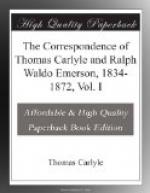gold blazonry and fierce gig-wheels, have little incommoded
him; they going their way, he going his.—As
for the results of the Book, I can rationally promise
myself, on the economical, pecuniary, or otherwise
worldly side, simply
zero. It is a Book contradicting
all rules of Formalism, that have not a Reality within
them, which so few have;—testifying, the
more quietly the worse, internecine war with Quacks
high and low. My good Brother, who was with
me out of Italy in summer, declared himself shocked,
and almost terror-struck: “Jack,”
I answered, “innumerable men give their lives
cheerfully to defend Falsehoods and Half-Falsehoods;
why should not one writer give his life cheerfully
to say, in plain Scotch-English, in the hearing of
God and man, To me they seem false and half-false?
At all events, thou seest, I cannot help it.
It is the nature of the beast.” So that,
on the whole, I suppose there is no more unpromotable,
unappointable man now living in England than I. Literature
also, the miscellaneous place of refuge, seems done
here, unless you will take the Devil’s wages
for it; which one does not incline to do. A
disjectum membrum; cut off from relations
with men? Verily so; and now forty years of
age; and extremely dyspeptical: a hopeless-looking
man. Yet full of what I call desperate-hope!
One does verily stand on the Earth, a Star-dome encompassing
one; seemingly accoutred and enlisted and sent to
battle, with rations good, indifferent, or bad,—what
can one do but in the name of Odin, Tuisco, Hertha,
Horsa, and all Saxon and Hebrew Gods, fight it out?—This
surely is very idle talk.
As to the Book, I do say seriously that it is a wild,
savage, ruleless, very bad Book; which even you will
not be able to like; much less any other man.
Yet it contains strange things; sincerities drawn
out of the heart of a man very strangely situated;
reverent of nothing but what is reverable in all ages
and places: so we will print it, and be done
with it;—and try a new turn next time.
What I am to do, were the thing done, you see therefore,
is most uncertain. How gladly would I run to
Concord! And if I were there, be sure the do-nothing
arrangement is the only conceivable one for me.
That my sick existence subside again, this is the
first condition; that quiet vision be restored me.
It is frightful what an impatience I have got for
many kinds of fellow-creatures. Their jargon
really hurts me like the shrieking of inarticulate
creatures that ought to articulate. There is
no resource but to say: Brother, thou surely
art not hateful; thou art lovable, at lowest pitiable;—
alas! in my case, thou art dreadfully wearisome, unedifying:
go thy ways, with my blessing. There are hardly
three people among these two millions, whom I care
much to exchange words with, in the humor I have.
Nevertheless, at bottom, it is not my purpose to
quit London finally till I have as it were seen




